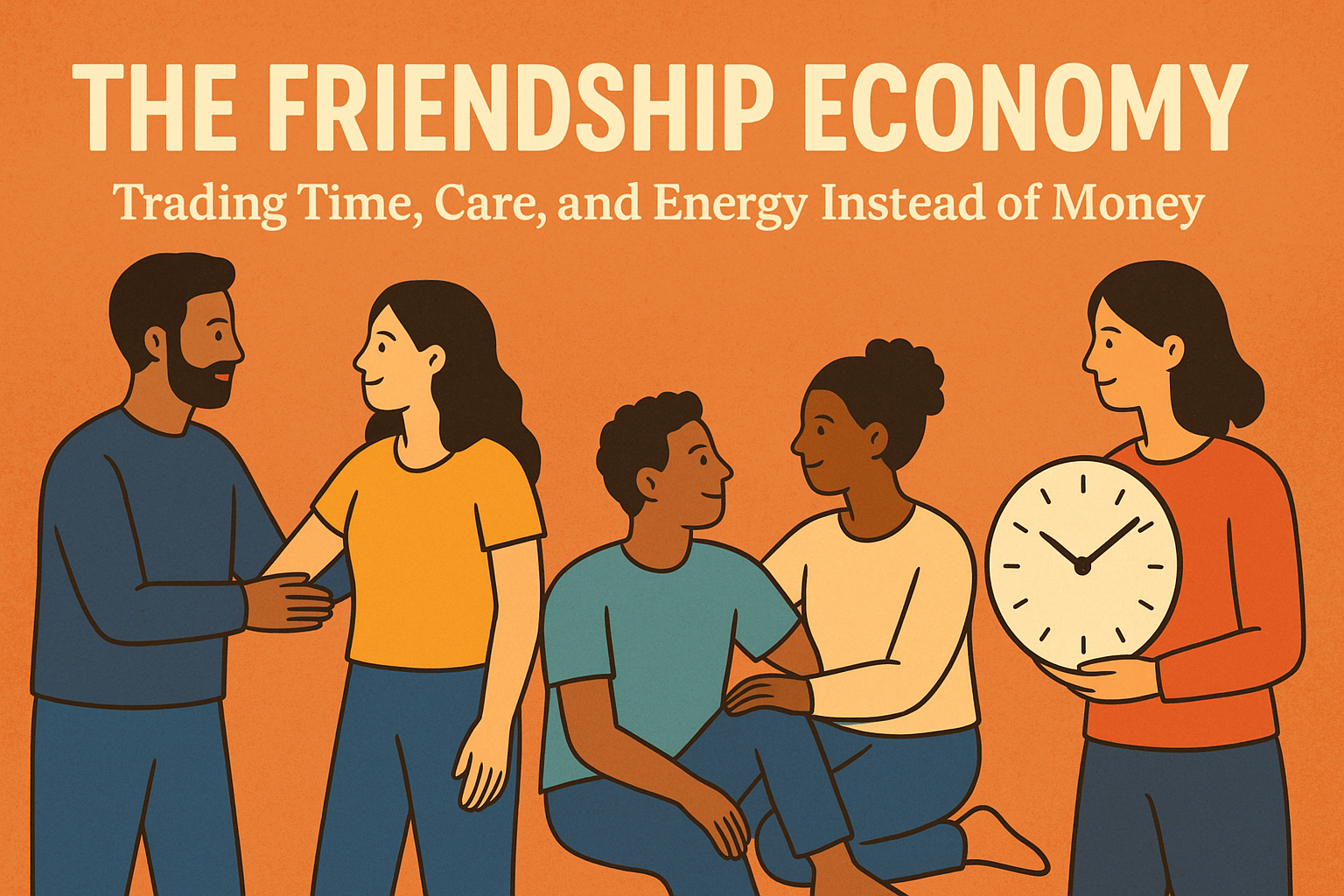The Friendship Economy — Trading Time, Care, and Energy Instead of Money
Introduction
In a world where there is almost a price tag to everything, it is nice to know that friendship is still one of the few things remaining that has value that is not transactional. This is precisely what we are beginning to realize — emotional wealth; time, thoughtfulness, energy, is significantly more valuable than material possessions. This could be the beginning of what many are coining, *The Friendship Economy*, where connection is the currency and generosity is not measured in dollars. It is the making of a life that truly feels rich, rather than looks rich... one shared moment at a time.

Redefining Value in Human Terms: Emotional Currency
Today, we are discovering that not all forms of wealth can be quantified in numerical terms. Emotional currency — including empathy, trust, kindness, and a genuine sense of care — is increasingly necessary to connect and flourish. When someone listens to us without judgment, or shows up at our side when we need it most, they add value to our experience and situation in a way that no material possession can. This kind of exchange will not appear on our balance statements; however, it generally sustains us longer than any amount of money ever could – especially as individuals become more cognizant of emotional burnout and isolation. We are beginning to detect care as a resource that exists to be hedged and shared. The friendship economy is fundamentally rooted in the reality of human warmth, support, and care – as more than a feeling, a force that fosters community. In this new economy, emotional generosity supersedes profit, and empathy becomes a form of shared wealth.
Time as the New Gold — Investing in Presence, Not Possessions
Time has quietly become one of the most valuable things we can offer someone. In the friendship economy, being truly present — not distracted, not multitasking, but there — is a profound act of generosity. Unlike money, time can’t be earned back after it’s lost, which makes it far more valuable. In our modern world, we frequently find ourselves measuring productivity, output, and completion of tasks, but healthy relationships are built on shared experiences, unhurried time, and small interactions. When we make the choice to spend our time with someone — whether it be a long walk together, a special talk, or just sitting beside someone in silence — we are really saying, “You matter more than my busy schedule.” This small act is a subtle rebellion against our culture of busyness and reminds us that our fulfillment doesn’t come from more material things, but more of being present with the people who bring significance to our lives.

The Reciprocity Shift: When Giving and Receiving Blur Together
Genuine friendship often flourishes from a harmonious rhythm that feels effortless — like giving and getting happens so easily, both people stop keeping score. Generosity is not about grand gestures or perfected symmetry in the friendship economy. Generosity is about an ebb and flow of energy in terms of giving and receiving, as both people feel seen, held up, and can lean into the friendship. At times, you are offering a shoulder, while at other times you are leaning on one. The reciprocity creates trust, the unseen spine of all healthy connections. As opposed to traditional, transactional relationships, this kind of reciprocity isn’t about earning, but rather, things that make relationships emotionally sustainable. Both parties should leave, talk, or hang out feeling lighter instead of loaded for having to repay the debt. As more of us move away from the tiring give-and-take model of modern networking, this gentle balance of mutual care is reshaping how we connect. It is a quiet revolution — when generosity circulates as easily in our lives as oxygen does in our lungs, friendships live on the energy of giving and receiving from one another.
Build Communities Beyond Commerce – The Emergence of Non-Monetary Networks
In cities and online, people are creating new types of communities — not based on money, but on mutual care and exchange. From food swaps in neighborhoods, to free skill-sharing circles, and online contexts for emotional support, these networks are built on trust instead of profit. They provide the correct orientation that community is not built on transactions, but on contributions – the choice to show up and give what you can. One offers childcare, another shares a few tomatoes from the garden, one helps with technology, one offers storytelling or companionship, and so on. These seemingly small contributions create a cascade of connectivity that no business model can replicate. The beauty of these spaces, is that they’re grounded in our shared humanity – they start from the belief that everyone has something valuable to contribute, even if that is just time or a listening ear. In the expansion of the friendship economy, it is non-monetary communities that emerge as models for a more caring and connected way of living.
Conclusion
The friendship economy reminds us that the richest exchanges in life are not within the confines of transactions, but in authentic moments of caring, time, and presence. A subtle return to the gift of what feeds our spirit, the people who give without keeping score, and who love without measuring. In a world obsessed with more, this is a celebration of enough. Because at the end of the day, what fills our lives is not money but connection.
